When Hannibal aired on NBC from 2013-2015 it was unlike anything seen before on network television. Which is to say that the gore in Hannibal, as artistically as it was presented, seemed very out-of-place on NBC. In truth, this was probably an intentional move by the network to compete with the shows on HBO, AMC, and then-upstart Netflix who were all providing more graphically adult content. But, don’t be mistaken, as gruesome as the visuals were, they were beautifully-rendered in their own way. This artistry was just as rare on network TV as any grisly crime scene.
Heavily serialized weekly shows were also a bit of a rarity on the networks at the time This is something that Netflix ended up using to its advantage by dropping entire seasons at a time and allowing viewers to binge at their own rate, rather than waiting several months to see a conclusion to any given storyline. All told, if Hannibal were released now, as artistically bloody and serialized as it was, it would be much better served on a streaming platform such as the aforementioned Netflix or Amazon Prime. As it happens, the entire three season run is currently available on both those services. I’ve been meaning to re-visit the show for some time now, and this seemed like the perfect opportunity for me to watch Hannibal as I believe it was intended. I was not disappointed.
Fair Warning: I am going to run through the events all three seasons of Hannibal, so there will be spoilers. Proceed with caution if you are interested in watching this show for the first time with fresh eyes.
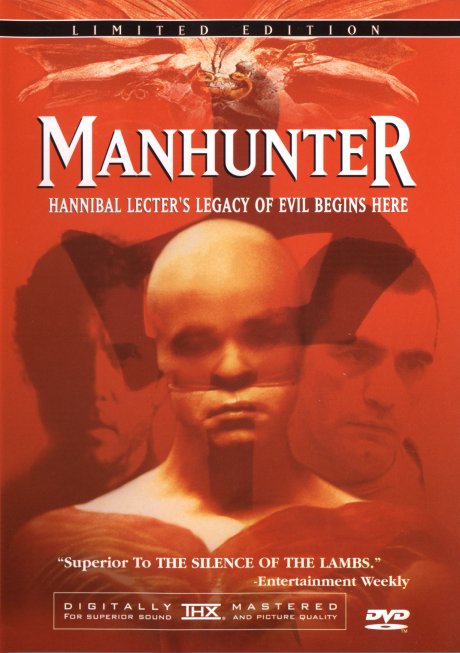
Thomas Harris’ fictional philosopher/serial killer/erstwhile cannibal Hannibal Lecter has been part of the widespread public lexicon for more than 30 years. Silence Of The Lambs was a massively-successful, Academy Award and Box Office winning film that made Lecter an icon. Though 1986’s Manhunter, which was based on Harris’ novel Red Dragon, was actually the first cinematic interpretation of the character. After Silence Of The Lambs, a sub-par sequel novel was written and movie was filmed, also titled Hannibal. After which we got a since-forgotten prequel called Hannibal Rising, and an ambitionless remake of the original adaptation of Red Dragon.
That’s a lot of source material, but here’s the good news: You don’t need to have read or seen any of those works in order to jump into Hannibal: The Series. Yes, you’ll get more out of the Easter Eggs and such if you are familiar, but the show is not beholden to any pre-existing continuity. In fact, it frequently undercuts expectations by throwing a new twist on the way events occurred in the novels and films. This both benefits and, in one particular instance, harms the show. But we’ll get to that latter issue further along.
Silence Of The Lambs is built around the relationship between Lecter and young FBI agent Clarice Starling. Their interplay is very much one between an older mentor and a somewhat reluctant protégé. But, before Agent Starling, there was Will Graham. Graham was the protagonist in the Red Dragon novel, and subsequent film adaptations. He was the man responsible for putting Lecter in that iconic plexiglass cell everyone remembers from Silence Of The Lambs. Apparently, the rights issues for Thomas Harris’ characters are a bit of a mess, so Hannibal: The Series could not make mention of Clarice Starling, even if they’d wanted to. However, they do introduce a Clarice analog in equally-young FBI Agent Miriam Lass. Things don’t work out quite as well for Miriam as they did for Clarice when she is brought into Lecter’s orbit. It’s an interesting, and tragic, dichotomy that very effectively sweeps the legs out from under the viewers’ expectations.
The lack of Clarice didn’t really bother me, since I’d always found Will more interesting than Clarice in that he was meant to be more of an equal to Lecter. The Sherlock Holmes to his Moriarty. What drew me to Hannibal in the first place was the announcement that Will and Lecter would essentially be co-leads in the show. They famously never shared more than a few pages, or a few minutes of screentime, together. So that relationship was ripe for exploring.
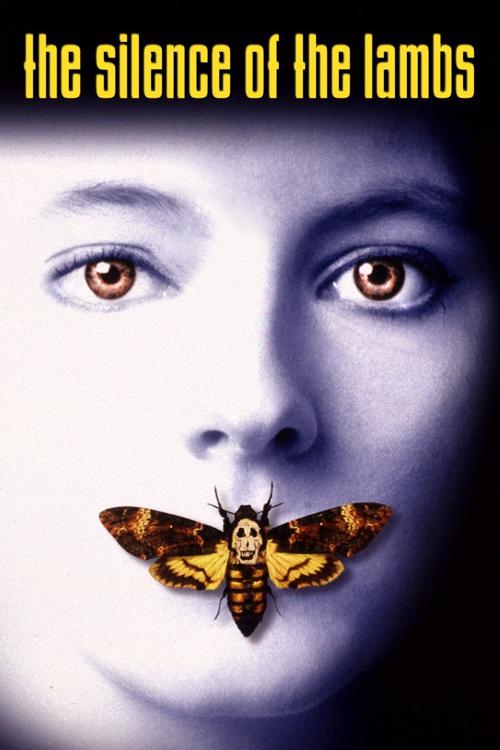
Hannibal Lecter is a brilliant psychiatrist, social butterfly, sociopath, murderer and cannibal. Will Graham is brilliant in his own way, but the cost of his brilliance is a near-superhuman level of empathy. That’s what allows Will to get into the minds of the killers that he profiles for his boss, Special Agent Jack Crawford, to bring to justice. For a man with no legitimate connection to his fellow human beings, as Lecter is, Will is something of a unicorn. That push-and-pull is the essence of their relationship as the show progresses.
What follows below here is essentially a summary of each of the three season of Hannibal. They won’t be especially deep dives into the episodes, but they will include major spoilers for the overall arcs of the seasons. So, consider this your final spoiler warning.
Season One plays the most like a procedural show that you might typically see on NBC, even though it did have its flourishes. Hannibal Lecter is a practicing, and renowned psychiatrist, who no one suspects is murdering and eating people – though he is very much already doing both of those things. Will Graham is coming off a case where, as we see in the pilot episode, he shoots and kills a different cannibalistic serial killer. Will is traumatized by the whole experience, and so Jack Crawford sets him up with Dr. Lecter to help manage the toll that Will’s profiling work takes on him. Needless to say, this ends up being a terrible decision.
Throughout the season, Will uses his gift to track down serial killers who commit the most atrocious and horrifying of crimes. What’s interesting is how the final result of many of these murders are presented as works of art. The production design and framing are darkly beautiful, at least until they pull back and show you the horrific entirety of what you’re looking at. A similar style is used when showing Lecter’s food preparation. Everything he makes, set to the tune of popular classical music compositions, looks more delicious than anything you’d see on the Food Network. “Food Porn” is a term I saw applied more than once, even though the viewer knows damn well that the meat used for the recipes is not the sort you could purchase at Whole Foods or Shop-Rite.
After each case Lecter spends a little time helping Will manage, while spending a lot more time trying to dissect Will’s psyche and find out what makes him tick. This is the most serialized part of the first season, Will is helping track down the elusive “Chesapeake Ripper” (aka: Dr. Hannibal Lecter) but not getting close, even though he’s sitting right across from him in therapy. Will also begins acting stranger as the season goes on, losing time, hallucinating, and otherwise losing his grip on reality. Only Lecter knows that Will is suffering from encephalitis, but he doesn’t share that knowledge as that would interfere with his curious mental experiments on Will.
Eventually, Will puts things together and realizes that Lecter is the Ripper. But, by the time he confronts him, Lecter has already framed Will as the Ripper. Will’s mental health is already so ravaged that he’s unable to effectively stop Lecter before Jack steps in and arrests him. The season ends with a twist on the popular “Hello Dr. Lecter” greeting that, to this point, was offered to Lecter in his cell. But, in this case, Lecter is the one standing outside the cell, while Will is locked up.

Season Two takes the serialization to the next level. Will spends the first half of the season, finally free of the encephalitis and thinking clearly, trying to figure out how to acquit himself while convincing all of his FBI colleagues that Lecter is the Ripper they’re hunting. It somewhat stretches credibility that everyone is so sure Will is the Ripper, and that Lecter could not possibly be anything more than he appears on the surface. This is especially egregious with the character of Dr. Alana Bloom, another psychiatrist who played a pretty important role in season one. But, in season two, she is depicted as so blindly believing in Lecter’s innocence that she begins a romantic relationship with him while wagging her finger at Will. It’s a bad character turn that is overcorrected a little in season three.
One thing that season two does better than season one is show the viewer some aspects of Lecter’s insanity that actually create a weaknesses in his armor. For one thing, he cannot stop killing and eating people, which undermines the case against Will, and ultimately leads to Will’s release. Will takes this opportunity to finally convince Jack that Lecter is the Ripper, and the two of them conspire to lure Lecter into a trap using Will as bait.
Lecter’s twisted, yet genuine, love (for lack of a better term) for Will is another of his weaknesses – eventually, this will prove to be his greatest weakness. Will and Lecter engage in a very interesting game of Cat-And-Cat as they re-engage as doctor and patient, only now with both knowing the other’s true selves. Lecter does manage to avoid saying anything direction actionable from a legal level, but he’s also no longer attempting to play Will for a fool. Thus, they finally become more like equals. This makes up most of the second half of season two, and really provides a tense and thrilling propulsion for the remaining episodes.
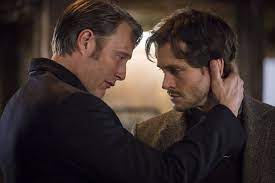
Lecter’s other symptom of madness is demonstrated by sharing his table with Will and Jack, not knowing that Jack is working with Will to bring him down. Lecter is happy to maintain the illusion that everything is still normal about their interactions, while providing meals and polite conversations. One might expect that, since Will openly acknowledges Lecter as the Ripper, he may have looped Jack in. But Lecter has the pathological need to believe that his mask is still fully functional. This allows Jack and Will to get close enough to spring their trap. Unfortunately, Jack’s boss shuts their plan down shortly before they could complete their sting operation.
The finale of season two is fantastic up until its final moments. I don’t recall the real world circumstances surrounding the show, though there had been some doubt cast regarding a third season pick-up. It seems likely that Hannibal received a late season three renewal or, possibly, a higher episode count for season three than they were expecting. That would account for the finale ending in a massive cliffhanger, rather than with any sort of closure. Or, it’s possible that my expectations were too colored by the source material, and therefore I was left hanging for a last moment that never came, leaving me massively disappointed.
For those unfamiliar with the events leading to Lecter’s capture in the books, and previous films: Lecter stabs Will in the gut, and goes to leave. But Will is able to shoot Lecter before he makes his escape allowing his back-up to arrive and take Lecter into custody while Will goes to the hospital. The season two finale plays out almost exactly in this manner. An added aspect is Jack Crawford fighting Lecter before Will’s arrival, and receiving a grievous injury of his own. Will shows up and gets stabbed by Lecter, who simply walks away from the scene of the crime. No gun shots. No capture. The season just ends with Jack and Will bleeding to death in Lecter’s fancy kitchen.
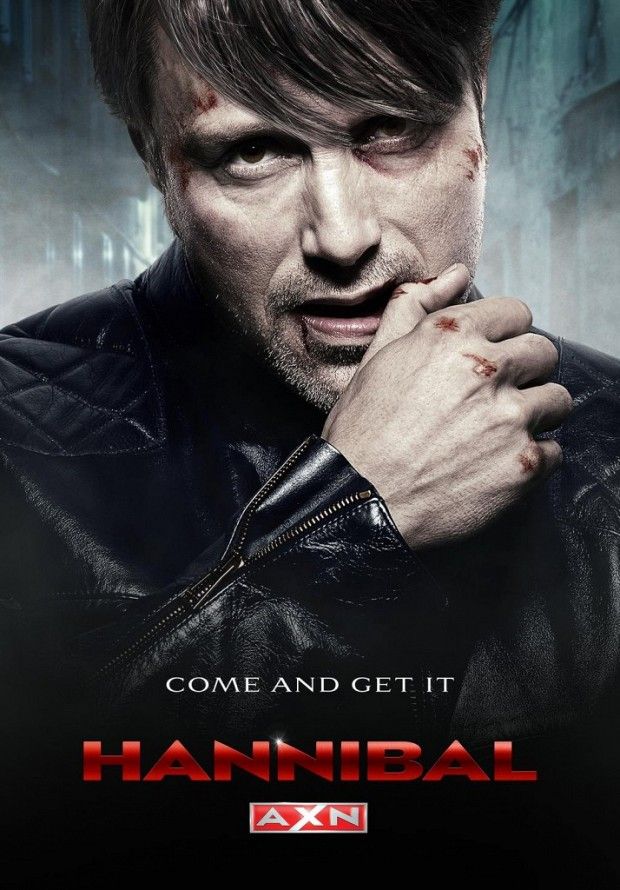
They do not die, however, because there is a season three. The final season has 13 episodes, and the first seven of those episodes are, in my opinion, the worst seven episodes of the show. Lecter is in Florence, Italy living the good life under an assumed identity while occasionally killing and eating his intellectual rivals. Will and Jack, both recovered, are hunting him separately. Each of these episodes are extremely methodical and dreamy. The scenery is absolutely lovely, and the production design is as lush as it ever was. But the story lacks any forward momentum whatsoever.
In the background of things, Mason Verger is seeking vengeance against Lecter after being drugged and convinced to mutilate his own face at the end of season two. Alana Bloom is by Verger’s side, as she is his sister Margot’s lover. Dr. Bloom dresses like a character from a Tim Burton movie, and is presented as much more cold and stern that in the previous seasons. As I mentioned above, I feel like this was an overcorrection from her season two arc. Regardless, the arc of these episodes involves Will, Jack, and Mason in a race with one another to see who can get to Lecter first.
Will manages to get to the same place at the same time as Lecter first, but Lecter manages to avoid a face-to-face confrontation. Jack tracks Lecter down next, just after Lecter disembowels an Italian police officer on Mason’s payroll, and beats the crap out of him as a receipt for the events of season two. But he misses out on his chance to finish the job on Lecter once and for all. Eventually, several other officers collect the bounty on Lecter, and bring in Will as well. This leads the action back stateside, where Lecter and Will end up prisoners at the Verger Estate.
Alana and Margot’s interests are in direct contrast to Mason’s, which leads to them helping Lecter and Will escape, while killing Mason. Lecter brings Will back home, where Will attempts to extricate himself from Lecter once and for all. In no condition to try to physically end Lecter, Will does the next best thing and tells the mad doctor that he is making the choice to completely remove him from his life in every way. Lecter seems genuinely hurt by Will’s words, as he still feels a powerful kinship with Will. Rather than disappearing from Will’s life, Lecter surrenders to Jack Crawford. His explanation being that, this way, Will will always know where he is and where to find him. Lecter considers this a victory but, as we learn later in season three, Will had anticipated Lecter’s response. Will later says to Lecter “I knew that if I’d kept chasing you, you would have kept running.” Instead, by rejecting him, Will allowed Lecter to seal his own fate while thinking he was getting the last laugh.
This leads to the final six episodes of season three and (as of this moment) the show as a whole. The creative team uses this opportunity to remake Red Dragon for a third time. Had season two ended with Lecter shot and captured, the logical start of season three would have been episode 8. This is why I theorize that the season three renewal and 13 count episode order were somewhat unexpected. If Hannibal had gone from the season two finale directly into Red Dragon, I would have considered it amongst the strongest 20 episode run of any TV show ever. As it stands, I do believe that Hannibal’s telling of this story is significantly better than the Red Dragon film from 2002, and even a little bit better than Manhunter – which is a movie I like quite a lot.
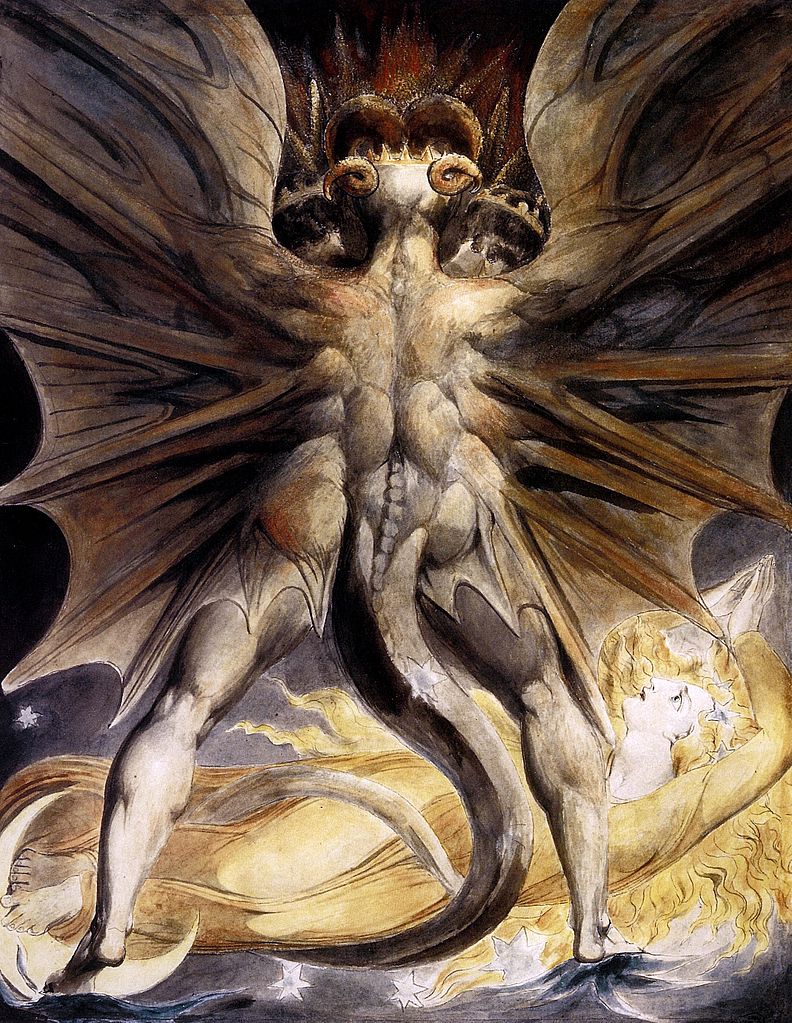
Episode 8 picks up three years after the events of episode 7. Hannibal Lecter is securely locked up, with Alana Bloom as his primary warden. Will Graham is happily married, seemingly retired, and trying his best to be a good stepdad. Jack Crawford is still at his FBI post, and has a big problem. A new serial killer, one who murders entire families, is at-large and he needs Will to come back to help hunt the killer, dubbed by the media as the Tooth Fairy, down. Will is reluctant, but his wife – Molly – knows that he wouldn’t be able to live with himself if he didn’t try to stop the Tooth Fairy before he kills again. So, Will comes back into the fray, and starts by visiting Lecter for the first time since he was imprisoned in order to get the scent back. Lecter is very pleased to see Will again, but the feeling is most certainly not mutual. He agrees to help, though both he and Will know that he will only help to the extent of his own amusement.
The Tooth Fairy is a man named Francis Dollarhyde, given that nickname due to the bite marks he leaves on some of his victims. He hates the name, as he sees himself more as a man transforming into a dragon. His psychosis is tied in some way to the famous William Blake painting “The Great Red Dragon And The Woman Clothed With The Sun” hence the name of the novel. We spend a fairly significant amount of time with Dollarhyde, who’s pretty terrifying but not what I’d call an overtly interesting character. Even though there is a creepy love story involving him and his blind co-worker, Dollarhyde is ultimately meant to serve as the Minotaur in the center of the labyrinth for Will.
Lecter doesn’t see Dollarhyde as a monster. In fact, a recurring theme with Lecter through the previous seasons is him encouraging serial killers to become the best, most interesting serial killer they can be. He even tried, to no avail up until this point, to make Will Graham into a murder. His relationship with Dollarhyde proceeds much along the same lines. Lecter is quite famous – more accurately infamous – by this point, having earned his new title Hannibal The Cannibal, and Dollarhyde tells him that he served as an inspiration for his own transformation. Lecter is flattered by this, and sees an opportunity to the Dollarhyde as the protégé than Will was never willing to be.
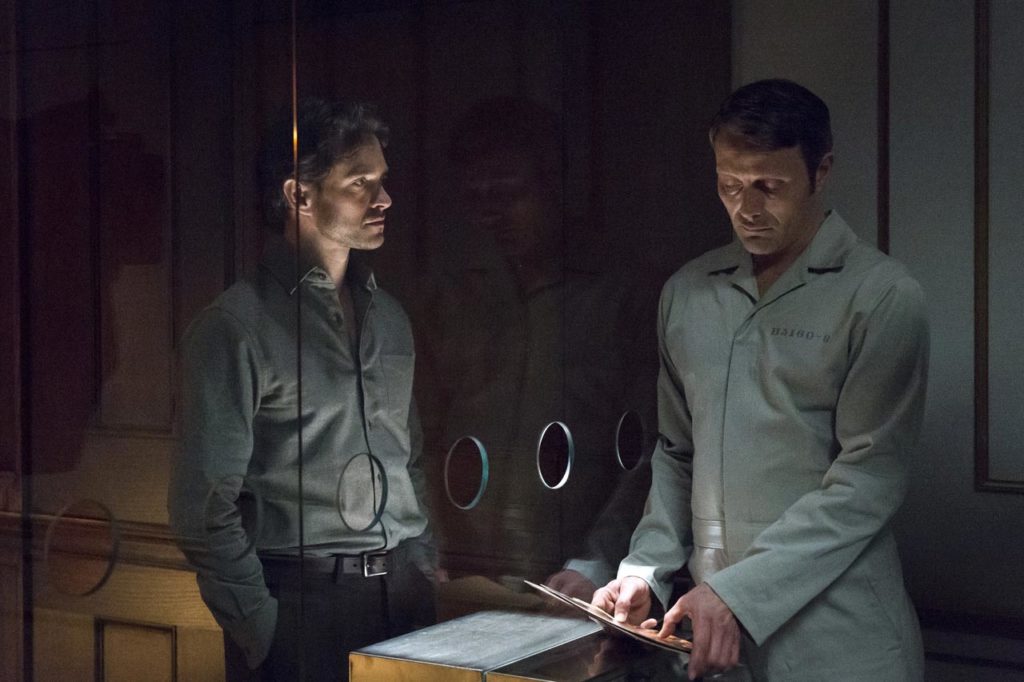
By the end of season three, two seemingly unconnected things happen: Lecter sends Dollarhyde to kill Will’s wife and stepson. But Molly is tougher than she looks, and manages to escape with her son. As Will becomes more determined than ever to stop Dollarhyde by whatever means necessary, he also accepts the shocking truth that Hannibal Lecter is in love with him. At least as much as someone like Lecter can love another person. Will decides to use this to put together one last plan with Jack Crawford: Stage a fake escape for Lecter, who will connect with Dollarhyde – who intends kill and eat Lecter to gain his strength – giving the FBI a chance to then kill Dollarhyde. The idea being to kill two monstrous birds with one stone.
Naturally, this plan backfires as Dollarhyde intercedes before they were ready for him, and breaks Lecter out for real. Lecter then bring Will along to a lovely, isolated, cliffside home. The assumption being that Dollarhyde will track them there to kill them. This assumption is correct, and Dollarhyde makes his entrance by shooting Lecter through the glass wall in the back. Will steps aside and allows Dollarhyde to proceed with his plan to kill Lecter. But then Dollarhyde – his psychic transformation into the Dragon clearly leading him to overestimate his abilities – attempts to take on Will and Lecter at the same time.
After a brutal fight that ends with Lecter and Will (again) grievously injured, the pair manages to kill Dollarhyde while atop the cliff. Lecter helps Will to his feet, and embraces him at the edge of the cliff, confessing “This is all I ever wanted for you, Will. For both of us.” It may be the only moment of pure honesty Lecter demonstrates through the entire run of the series. Will knows this, and realizes that Lecter has completely let his guard down with him for the first time. Will then takes the opportunity to wrap his free arm tightly around Lecter’s neck, and launch them both off the cliff to the raging sea below to their apparent deaths. It may have cost Will his own life, but he did accomplish his goal of ridding the world of both Dollarhyde and Lecter.
Now, there is a post-credits sequence that is left somewhat open to interpretation. Dr. Bedelia Du Maurier, Lecter’s psychiatrist who had proven to be nearly as twisted as him, is dressed up at a dinner table about to be served her own severed leg. If the show had been renewed for a fourth season, this would have seemingly been the way to confirm that Lecter – and likely Will – survived their dive off the cliff. But it was never renewed for another season, or even a standalone movie, so one could just as easily interpret this sequence in another way. Du Maurier was Lecter’s accomplice for several months after he escaped to Florence as she wished to study him in his natural habitat. She managed to escape justice through her own machinations after Lecter turned himself in. But her mind was riddled with paranoia, so it could also be assumed that – if Lecter’s body was never found – she entered a fugue state, and prepared her own leg for dinner. It’s a bit more of a stretch, but is easy enough to sell yourself on if you’re looking for a bit more closure on the story that will likely not be continued.
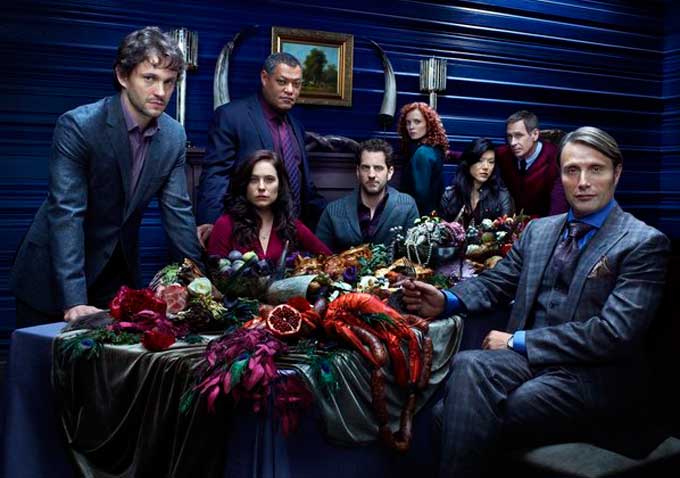
If you’ve read this far, then you clearly have an interest in the show. Hell, the spoilers in this article may even convince you that you won’t be wasting 40 hours on something lackluster. The devil is in the details, as they say, and Hannibal is absolutely a devil worth getting the know the details of. I’ve mentioned the lush production design at the top but, honestly, every part of the production was phenomenal. The writing is sharp, clever, and offers more-than-a-little gallows humor. The directing of each episode is top notch, and the cast is fantastic from the top billed stars, all the way down to the one-off guest stars.
In this era of endless streaming platforms, and the primary cast being pretty open to the idea of reviving the show in – even six years after the final episode aired – there is always a chance that we get more in some fashion. Hell, CBS has already delved back into the IP with their show Clarice starring – you guess it – Clarice Starling, the Thomas Harris brand is still well in-demand. Hannibal ran only 39 episodes, out of which there were only a handful that underwhelmed. Believe me when I say you can, and should, binge this series in a week. If nothing else, it will allow your imagination to run wild next time you watch anything on Food Network.